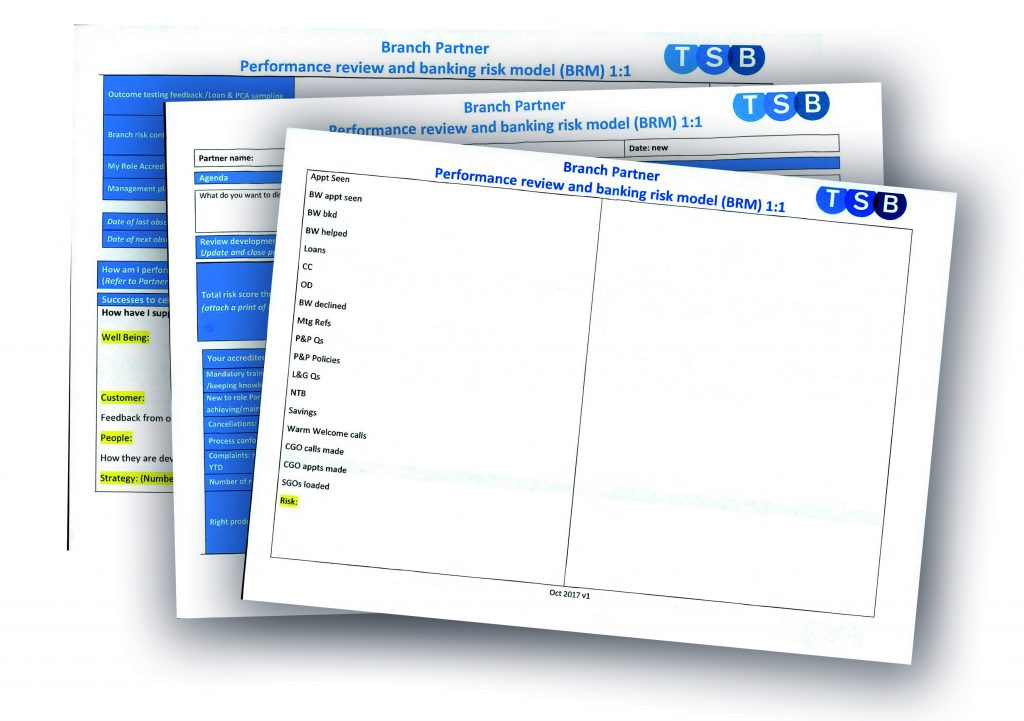It didn’t take long for the “world without sales” to become the world where only sales count.
Members in one group, and we’ve seen similar forms in other groups as well, have been told to set out all the sales they have made personally and all the leads they have identified for colleagues. So, staff are required to set out how many loans they have done, how many current accounts they have opened and how many protection policies they have sold. That sales performance is then being used as part of the scorecard review and ultimately to determine ratings for the half-year. Our concern is that sales performance is now the key driver for ratings, which goes against everything TSB has talked about for the last few years.

We understand the new Chief Executive needs to improve the performance of the business quickly but not at the expense of the trust of customers. If customers just see TSB as another bank trying to separate them from their money then its future is limited. TSB was always about challenging the Big 5 not just imitating what they do. There was no love lost with Paul Pester, but he understood that differentiation is key and took every opportunity to get that point across. The new Chief Executive needs to stop hiding in Gresham Street and start banging the drum for challenger banks.
The vast majority of line managers in TSB are dealing with staff properly when it comes to sales and ratings, and they will always try to do so regardless of the pressure they come under from above, but there are some who will push the envelope and we will have no compunction in outing those line managers in Newsletters. Those line managers have been warned.
Working Hours – Recording Actual Time Worked.
One of the consequences of TSB’s cost cutting exercise will be those staff that are left will be required to pick up the slack. Staff will be expected to do more with fewer resources and for many that will mean longer working hours.
The European Court of Justice (ECJ) has ruled that employers must keep detailed records of all hours worked by their workers each day, in order to comply with the rules on maximum weekly working time and rest breaks.
The landmark ruling will mean employers have to ensure that they have adequate systems in place to record the exact number of hours worked, to give employees “proof” – should they require it – that their rights are not being breached.
In the UK, under Regulation 9 of the Working Time Regulations 1998, employers are required to keeps records to show that workers are not working in excess of 48 hours a week. However, employers are only required to keep adequate records whereas this new ruling requires them to put in place ‘objective’, ‘reliable’ and ‘accessible’ record-keeping.
The key points from the decision are as follows:
- The right to maximum working hours and rest breaks is a particularly important rule of EU social law, enshrined in the Charter of Fundamental Rights of the EU.
- The purpose of EU-level working time rules is to guarantee better protection of the health and safety of workers, and member states must ensure that these rights are guaranteed in full.
- An objective and reliable determination of the number of hours worked each day and week is essential to enable both workers and employers to verify that these rights have been complied with. Without this, the rights are liable to be rendered meaningless.
- Use of other evidence – such as witness statements, emails or telephone and computer records – is not sufficient. This does not provide objective and reliable data, particularly taking into account the fact that workers are the weaker party in the employment relationship and may be reluctant to give evidence against their employer.
- Member states have discretion around the specific arrangements they make to implement a system for requiring employers to record hours worked.
Whilst the ECJ’s judgement is clear, what that means for the UK is less clear. The onus is now on the Health and Safety Executive to introduce new guidelines for employers but that seems unlikely in the short terms given the fact that the terms of Brexit, which may or may not mean that the UK is bound by the decision, has still to be decided. We will be writing to the HSE asking them to outline the next steps for implementing this case. In the meantime, the union’s lawyers are reviewing the case to see what can be done to protect members’ rights.
In the meantime, members with any questions can contact the Union’s Bedford Office on 01234 716029 (Choose Option 1).
Please click this text to view the Union’s 2018 Statement To Members.
